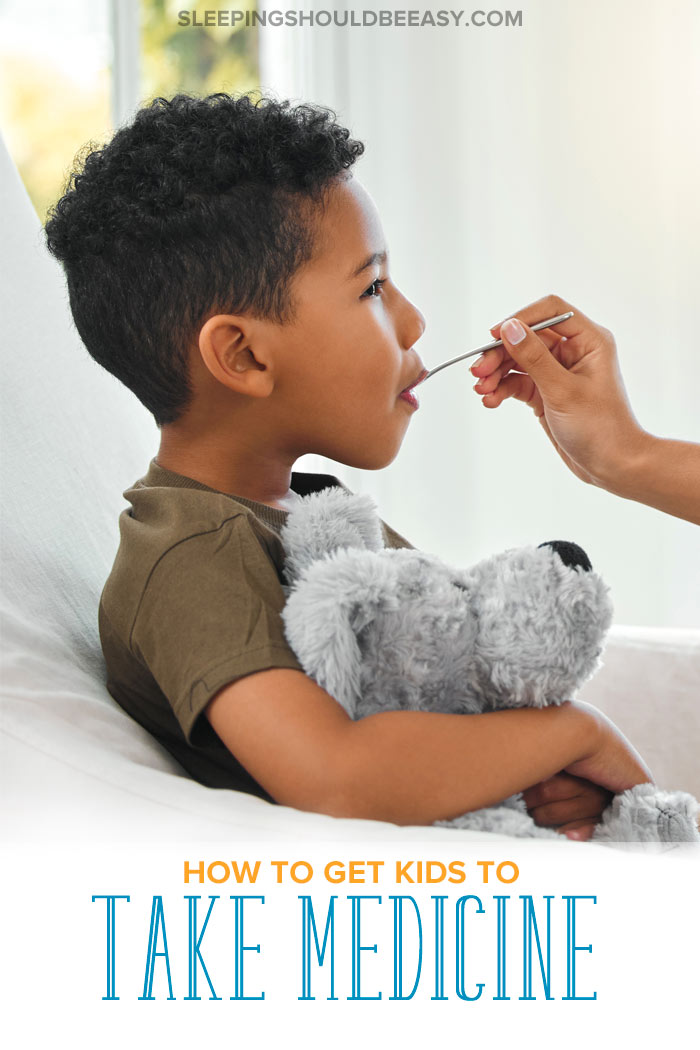How to Get Kids to Take Medicine
Wondering how to get kids to take medicine? Discover the biggest reason your child puts up a fight, and effective tips that can help.
 When I was younger, someone thought it’d be a great idea to smash a medicine pill into crumbs and mix it into my glass of water to swallow. Back in the day, you didn’t have cherry flavor liquids or chewable vitamins. Instead, when kids refused to take medicine, apparently you crumbled it into water, hoping they’d drink it.
When I was younger, someone thought it’d be a great idea to smash a medicine pill into crumbs and mix it into my glass of water to swallow. Back in the day, you didn’t have cherry flavor liquids or chewable vitamins. Instead, when kids refused to take medicine, apparently you crumbled it into water, hoping they’d drink it.
While medications have improved over the years, many of us still find ourselves struggling with getting our kids to take medicine.
But what if it didn’t have to be this way? What if you made simple changes that could help you get your child to take medicine, all without a fight?
You see, the most important tip isn’t a special wrestle-hold or shooting the medicine down with a syringe. It all boils down to this:
Change the way you talk to your child about taking medicine.
Yup, it’s that simple. But it starts by taking a higher look at what’s really going on: a sick child who’s already scared and suspicious of medicine, especially after all he’s gone through.
Yet here we are, forcing medicine and finding ways to get our kids to take it, without considering how they might be feeling.
So, what are a few simple ways you can talk to your child that can get him to take his medicine? Take a look at these important tips you can try right away:
Table of Contents
1. Praise your child for being brave
My son was exhausted. We were in the emergency room, long past his bedtime, because earlier in the evening, he not only had a fever but a seizure as well. Nurses and doctors administered not just medicine, but tests galore, from getting nose and throat samples to taking an x-ray.
As if he didn’t already have so much on his plate… now this.
We forget how much kids go through when they’re sick, and how miserable they feel. Trying to get them to take medicine can seem like a nuisance to us, but feels that much worse to someone already unwell.
That’s why one of the best ways to show support and reassure your child that all will be fine is to praise her for being brave. She feels acknowledged for all she’s going through and sees that, even though it’s uncomfortable, taking medicine is the brave and right thing to do. According to Dr. Gwen Dewar, Ph.D. on Parenting Science:
“Praise can boost good feelings and increase motivation. It can inspire children to be more cooperative, persistent, and hard-working.”
Praise also helps you show empathy the next time she needs to take her medicine again. She’s not trying to make trouble so much as struggling herself, both physically and emotionally.
Free ebook: Want simple tweaks to stop feeling overwhelmed and start managing your time? Join my newsletter and grab Time Management Strategies for the Overwhelmed Mom below—at no cost to you:
2. Talk about medicine in a positive way
“You have to take your medicine.”
“Let’s not throw a tantrum about taking medicine again, okay?”
“Why won’t you just drink it already?!”
How do you talk about medicine with your child? If you’re exasperated by the challenges of getting her to take medicine, then likely not in a positive way. And that’s understandable—she’s not exactly eager to take the next dose, even after all this time.
Still, watch how you talk about medicine, because your attitude can convince her to take it—or not.
Talk about how medicine can help her feel better and back to normal. Discuss how it goes through her body to bring her fever down or fights the germs or bacteria that are making her feel bad. Get better-tasting medicine and be excited when it’s time to take the next dose (instead of dreading it).
Changing your tone of voice and choice of words can make a huge difference in how she sees medicine. As I say in my parenting workshop, How to Get Your Child to Listen:
“Yelling and being bossy doesn’t feel good to either you or your child—you both come out of the situation feeling drained, upset, hurt, resentful, and a whole lot of other negative emotions.”
3. Treat medicine as non-negotiable
Somewhere between pleading and punishment, taking medicine suddenly became a choice.
Here’s the thing: it’s not. Except your child might continue to think it is if you present it that way.
Yes, for some, gimmicks and techniques work, especially at first. But sometimes they do so at the cost of making medicine a choice when it’s really not. Think of it this way: you’d never think to not buckle her in a car seat, despite the epic tantrums she throws. The same is true with medicine.
You don’t need to be “mean” about it, but you do need to convey that this isn’t a choice, but a necessity. When she realizes that medicine is non-negotiable—and when you follow through as well—then she can be more willing to comply.
4. Make taking medicine part of your child’s routine
Disclosure: This article contains affiliate links. As an Amazon Associate, I earn from qualifying purchases.
Kids thrive with routine, especially because they don’t have to think about what to do next. One simple way to make taking medicine easier is to attach it to a regular part of your child’s routine.
Maybe that means she takes the medicine after meals and snacks, or that she takes her antibiotic before taking a bath for the next few days. By tying it to a consistent part of her day, she’s more likely to expect it than if she were to take it at random times of the day.
One tip you can even do is to create a “dosage chart” she can see.
Whether on a cardboard or dry erase board, write the dates and times she needs to take the medicine with boxes to mark them complete. Then have her cross off each box after she takes the medicine. Not only does she have a visual cue, but she also feels more accountable for recording her doses.
5. Give your child a choice
One of the best ways to get kids to follow directions they typically resist is to offer them a choice. Having a say in how to take medicine can be all your child needs to finally do so.
To be clear: taking medicine or not isn’t the choice—that’s non-negotiable. But you can still say, “It’s time to take your medicine. Do you want me to hold the cup, or do you want to do it yourself?” or “Do you want to take the medicine in the bathroom, or do you want me to bring it to you?” or “Do you want to put the dropper toward your cheek or under your tongue?”
Notice that you’re okay with either choice, because, at the end of the day, she’s still going to take the medicine. And one last thing: stick to two choices, because any more than that might be too many for her to weigh and decide.
6. Make medicine more appealing
A simple way to get your child to take a dose of medicine? Pair it with something he enjoys. This extra incentive can be just the trick to at least make the experience palatable.
For instance, if he needs to take it in sprinkles form, add it to applesauce. Perhaps you’ll follow his chewable tablets with a meal he loves. Maybe you’ll give him a popsicle to temper his taste buds. Or, like with my son’s liquid medication that he says can taste bad, we break the full dose between sips of water in between.
Conclusion
We’ve all been there, whether it’s pleading with our kids to take medicine or feeling impatient when they won’t. But as you can see, you can change how you talk to your child about taking medicine.
Start by praising her for being brave and doing things even when it’s hard. Watch how you talk about taking medicine and phrase them in positive ways. Treat it as non-negotiable, something that must be done despite her resistance.
Make taking medicine part of her routine, and even have a visual chart she can see and use. And finally, give her choices, not in whether she wants to take the medicine, but in how.
It’s totally possible to get her to take medicine when you change the way you talk about it. Especially when you don’t have to crumble a nasty-tasting pill into a glass of water anymore.
Get more tips:
- How to Stop Your Toddler Whining (Even When You’ve Tried Everything)
- 9 Things to Do When Your Child Is Sick
- How to Respond When Your 3 Year Old Won’t Sleep
Don’t forget: Join my newsletter and grab Time Management Strategies for the Overwhelmed Mom below—at no cost to you:


